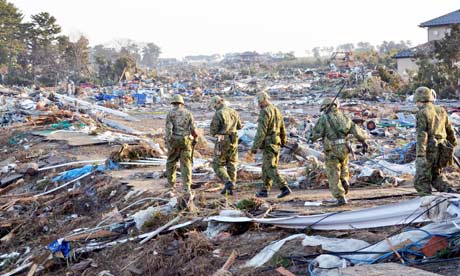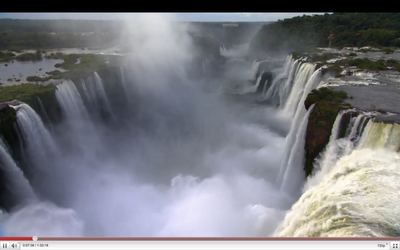Tens of thousands believed to have died as result of tsunami and huge earthquake that triggered it

The death toll from the Japanese earthquake and tsunami is expected to exceed 10,000 as local and international rescue teams search through the ruins of north-eastern coastal cities for survivors of last Friday's disaster.
Two thousand bodies have been found on the shores of Miyagi prefecture, which suffered the brunt of the damage, according to the Kyodo news agency.
Despite the deployment of 100,000 Japanese troops and more than 500 foreign rescue specialists, the relief operation is being hampered by the damage done to the country's transport infrastructure, with roads and rail, power and ports crippled across much of the disaster region.
Officials say at least 10,000 people in more than a quarter of Japan's 47 prefectures are likely to have been killed in the 8.9-magnitude earthquake and tsunami that followed it.
According to the Japanese media, the provisional death toll is as follows:
Miyagi prefecture
• At least 785 people confirmed dead in cities including Kesennuma, Higashimatsubara and Sendai, but local authorities fear more than 10,000 people may have died in the prefecture alone.
• Around 2,000 bodies found on two shores, including those in the town of Minamisanriku and Ishinomaki City.
• Minamisanriku has a population of 17,000, but 10,000 are missing after the tsunami.
Iwate prefecture
• At least 574 people confirmed dead, including those in Ofunato and Rikuzentakata.
• The city of Rikuzentakata, with a population of 23,000 people, was "almost completely wiped out", the fire department says. No information yet on how many survived. More than 80% of the city was flooded.
• In the town of Otsuchi, out of a population of 15,000 people 12,000 are missing.
Fukushima prefecture
• About 420 people, including those in Iwaki and Minamisoma cities, are confirmed dead. Around 1,200 people are missing.
Death toll in other districts
• Tokyo: 7
• Chiba: 15
• Ibaraki: 19
• Aomori: 3
• Tochigi: 4
• Kanagawa: 3
• Hokkaido: 1
• Yamagata: 1
• Gunma: 1
Patrick Fuller of the International Red Cross Federation, described the situation in Otsuchi as "a scene from hell, absolutely nightmarish".
He added: "The situation here is just beyond belief, almost everything has been flattened. The government is saying that 9,500 people, more than half of the population, could have died and I do fear the worst."
In one town in Fukushima prefecture, the crematorium was unable to handle the crush of bodies being brought in for funerals.
"We have already begun cremations, but we can only handle 18 bodies a day. We are overwhelmed and are asking other cites to help us deal with bodies. We only have one crematorium in town," Katsuhiko Abe, an official in Soma, told the Associated Press.
Fires burned in the hills overlooking Otsuchi, further complicating rescue efforts. That, combined with near-freezing temperatures and the sheer extent of the damage, make chances for surviving this disaster slim.
The scale and complexity of the disaster has shaken Japan to the core.
Survivors walked through the rubble, many in tears after losing loved ones, others unsure of the fate of family and friends. They lined up in front of noticeboards at emergency centres looking for news.
"I am looking for my parents and my older brother," Yuko Abe, 54, said at an emergency centre in Rikuzentakata, an all-but-flattened town of 24,500 people in Iwate prefecture.
"Seeing the way the area is, I think perhaps they did not make it. I also cannot tell my siblings who live away that I am safe, as mobile phones and telephones are not working."
Many people spent another freezing night huddled in blankets around heaters in shelters along the coast. Almost 2m households were without power, the government said, with about 1.4m without running water.
The Japanese prime minister, Naoto Kan, said food, water and other necessities such as blankets were being delivered by vehicles but because of damage to roads, authorities were considering air and sea transport.
There are also fears for the wellbeing and safety of thousands of ill and elderly people who were in hospitals when the quake and tsunami hit.
There are no figures yet on how many hospitals were affected, but few could have escaped unscathed given the scale of the destruction.
Sam Taylor, a spokesman for Médecins sans Frontières, which has sent a team to Japan, said there were longer-term concerns about the elderly, many of whom were fragile and may be living on little food and water without their lifesaving medicines.
"They have some medicines for the immediate future, but in the coming weeks that's when it really could become an issue," he said.
With even hospitals deprived of aid, many ordinary survivors are living hand-to-mouth.
Osamu Hayasaka, from Takajo, near Miyagi prefecture's capital of Sendai, said the government hasn't provided any relief to people who didn't move into the refugee centres. The 61-year-old strapped two cardboard boxes of soft drinks on his bicycle to take home to his family of six, including his sick mother, and neighbours.
"There are a lot of older people near where I live, so I'll give them some of this," he said.
Hayasaka said the local supermarkets are running out of goods. He queued for two-and-a-half hours on Sunday and was allowed to buy just a few items, including a grapefruit and an orange.
In a community centre crammed full with hundreds of people, there is slightly more to eat.
"Today I had some cake and an orange," said Yuto Hariyu, 15, whose school was destroyed the day before his graduation ceremony.
"I'm hungry, but what I want most is furniture, like a bed, and a TV," said Yuto's classmate, Shio Fujimura.
At a government-run centre for the elderly on the outskirts of the city, the food allotment on Monday was two rice balls, one in the morning and one at night, according to Takahashi Sata, 43, who works at the centre.
"Yesterday I had two rice crackers and a bottle of water," he said. "Today there is nothing for anyone."





